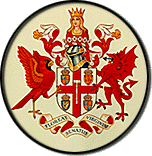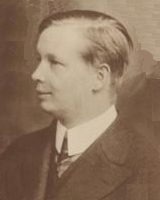
The Virginia General Assembly is the legislative body of the Commonwealth of Virginia, the oldest continuous law-making body in the Western Hemisphere, the first elected legislative assembly in the New World, and was established on July 30, 1619. The General Assembly is a bicameral body consisting of a lower house, the Virginia House of Delegates, with 100 members, and an upper house, the Senate of Virginia, with 40 members. Senators serve terms of four years, and Delegates serve two-year terms. Combined, the General Assembly consists of 140 elected representatives from an equal number of constituent districts across the commonwealth. The House of Delegates is presided over by the Speaker of the House, while the Senate is presided over by the Lieutenant Governor of Virginia. The House and Senate each elect a clerk and sergeant-at-arms. The Senate of Virginia's clerk is known as the "Clerk of the Senate".

The Senate of Virginia is the upper house of the Virginia General Assembly. The Senate is composed of 40 senators representing an equal number of single-member constituent districts. The Senate is presided over by the lieutenant governor of Virginia. Prior to the American War of Independence, the upper house of the General Assembly was represented by the Virginia Governor's Council, consisting of up to 12 executive counselors appointed by the colonial royal governor as advisers and jurists.
Lloyd Campbell Bird was a pharmacist, businessman and Democratic politician who served as a Virginia State Senator for 28 years and helped found Virginia Commonwealth University in Richmond.

The West Virginia Legislature is the state legislature of the U.S. state of West Virginia. A bicameral legislative body, the legislature is split between the upper Senate and the lower House of Delegates. It was established under Article VI of the West Virginia Constitution following the state's split from Virginia during the American Civil War in 1863. As with its neighbor and former constituent Virginia General Assembly, the legislature's lower house is also referred to as a "House of Delegates."

The 1912–13 United States Senate elections were held on various dates in various states. They were the last U.S. Senate elections before the ratification of the Seventeenth Amendment in 1913, establishing direct elections for all Senate seats. Senators had been primarily chosen by state legislatures. Senators were elected over a wide range of time throughout 1912 and 1913, and a seat may have been filled months late or remained vacant due to legislative deadlock. Some states elected their senators directly even before passage of Seventeenth Amendment. Oregon pioneered direct election and experimented with different measures over several years until it succeeded in 1907. Soon after, Nebraska followed suit and laid the foundation for other states to adopt measures reflecting the people's will. By 1912, as many as 29 states elected senators either as nominees of their party's primary or in conjunction with a general election.

James Hubert Price was an American politician who was elected 53rd Governor of Virginia in 1937, during the Great Depression and became known as the Commonwealth's "New Deal Governor." Over the opposition of the Byrd Organization, Price, a Virginia attorney and businessman, passed many social programs and implemented other federal programs to benefit Virginians. Price had previously represented Richmond as one of its delegates in the Virginia House of Delegates for over a decade (1916–1930), as well as served as Lieutenant Governor for two terms beginning in 1930.

Patrick Henry Drewry was a Virginia lawyer and Democratic politician who served in the United States House of Representatives and state senate.

Emmett Wilson Hanger Jr. is an American politician of the Republican Party. He was a member of the Virginia House of Delegates from 1983 to 1991, when he was unseated by Creigh Deeds. Since 1996 he has been a member of the Senate of Virginia, representing the 24th district. This district, located in the central Shenandoah Valley and nearby sections of the Blue Ridge Mountains, includes the independent cities of Staunton, and Waynesboro, as well as Augusta County, Greene County, Madison County, and parts of Rockingham County and Culpeper County.
John A. Cosgrove is an American politician. On August 16, 2013, he was sworn in as a member of the Senate of Virginia, representing the 14th district, after winning an August 6 special election to replace the retiring Harry Blevins.
Benjamin Joseph Lambert, III was an American optometrist, community leader and politician. A Democrat, Lambert served for more than three decades in both houses of the Virginia General Assembly, initially in the Virginia House of Delegates and then in the Senate.
Richard Hayden Black is an American politician. A Republican, he served as a member of the Virginia State Senate, representing the 13th District, which encompasses parts of both Loudoun and Prince William Counties, from 2012 to 2020. Black was previously a member of the Virginia House of Delegates from 1998 to 2006. Black announced that he would not seek re-election in 2019, instead retiring at the end of his term.

John Preston Buchanan was an American politician who served as a member of the Virginia Senate, representing the state's 1st district.

Cyrus Harding Walker was an American lawyer and Democratic politician. First elected to the Virginia Senate in 1898 after a brief stint in the House of Delegates, he went on to serve in this body for the next two decades. For the last five years of his tenure as the 34th district's senator, he was the President pro tempore of the Senate of Virginia.

Theodore Clay Pilcher was an American Democratic politician who served as a member of the Virginia Senate, representing the state's 11th district from 1916 until his death just under two years later. From 1891 to 1901, he represented Fauquier County in the House of Delegates.

The 108th Virginia General Assembly was the meeting of the legislative branch of the Virginia state government from 1914 to 1916, after the 1913 state elections. It convened in Richmond for two sessions.

The 110th Virginia General Assembly was the meeting of the legislative branch of the Virginia state government from 1918 to 1920, after the 1917 state elections. It convened in Richmond for two sessions.

Edward Griffith Dodson was an American lawyer and Democratic politician who was Clerk of the Virginia House of Delegates from 1934 to 1962, and author of much-used biographical compilations of Virginia public officials.

Frederick Thomas Gray was a Virginia attorney and Democratic Party politician. Governor J. Lindsay Almond appointed Gray to serve as Attorney General of Virginia after the resignation of Attorney General Albertis Harrison to run for Governor of Virginia during the Massive Resistance crisis in Virginia. Gray returned to private practice at Williams Mullen after Robert Young Button took office. Gray later served in the Virginia House of Delegates and the Virginia Senate as he continued his law practice.
William Francis Stone was Virginia lawyer and member of the Virginia General Assembly representing Martinsville as well as Patrick and Henry Counties between 1954 and 1957, first as a delegate and then elected to a partial senate term in a special 1957 election upon the death of Frank P. Burton. A member of the Byrd Organization, Stone was a member of the Boatwright Committee which investigated the NAACP as part of the Massive Resistance to racial integration vowed by U.S. Senator Harry F. Byrd after the U.S. Supreme Court decisions in Brown v. Board of Education.

Arthur C. Harman was an American businessman and Democratic politician who served in both houses of the Virginia General Assembly, representing the state capital of Richmond.



































































































































































